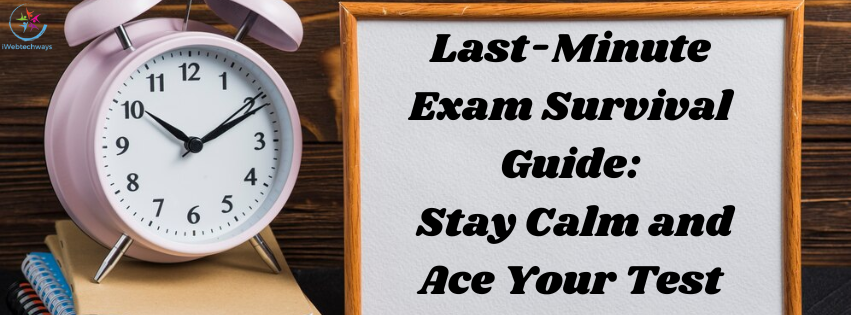We’ve all been there—an important exam is looming, and somehow, despite all the promises to start early, you find yourself cramming at the last minute. While it’s far from the ideal way to prepare, it’s still possible to make the most of the time you have left and improve your chances of success. Here’s your ultimate survival guide to tackling last-minute exam stress and maximizing your performance.
Step 1: Don’t Panic – Assess Your Situation
First things first: take a deep breath. Panicking will only make things worse by clouding your judgment and making it harder to focus. Instead, take a few minutes to assess what you need to study, how much time you have, and what’s realistically achievable.
- Check the syllabus – Identify the key topics that are most likely to appear on the exam.
- Prioritize topics – Focus on high-weightage sections or areas you struggle with the most.
- Set a schedule – Allocate time slots for different subjects or topics to ensure you cover the most important points.
Step 2: Use Efficient Study Techniques
When time is short, smart study strategies can help you absorb information quickly and effectively.
Active Recall and Spaced Repetition
Instead of passively reading your notes, try active recall by testing yourself on key concepts. Use flashcards, quiz yourself, or teach the material to a friend (or even your pet). If you have slightly more time, spaced repetition—reviewing information at increasing intervals—can reinforce learning.
Summarization and Mind Maps
Create concise summaries or mind maps of topics to visualize connections between concepts. This technique is particularly useful for subjects with a lot of interconnected ideas, such as history, biology, and economics.
Past Papers and Practice Questions
If you only do one thing, make it past papers. Practicing previous exam questions will familiarize you with the format, improve your time management, and help you identify frequently tested topics.
Step 3: Cut the Distractions
Time is your most valuable resource, so don’t waste it on distractions.
- Use the Pomodoro Technique – Study for 25-30 minutes, take a 5-minute break, and repeat. After four cycles, take a longer break.
- Eliminate social media – Put your phone on airplane mode or use website blockers to prevent mindless scrolling.
- Find a quiet study space – A library, a quiet room, or even noise-canceling headphones can help you concentrate.
Step 4: Use Mnemonics and Memory Tricks
For quick memorization, use mnemonics, acronyms, rhymes, or associations. For example:
- PEMDAS (Parentheses, Exponents, Multiplication & Division, Addition & Subtraction) for math operations.
- My Very Educated Mother Just Served Us Nachos (Mercury, Venus, Earth, Mars, Jupiter, Saturn, Uranus, Neptune) for planet order.
Step 5: Take Care of Your Body
Neglecting your physical well-being can sabotage your exam performance. Follow these last-minute health tips:
- Get some sleep – Pulling an all-nighter might seem tempting, but sleep is crucial for memory consolidation and focus.
- Eat brain-boosting foods – Opt for proteins, nuts, fruits, and vegetables instead of sugary snacks that cause energy crashes.
- Stay hydrated – Dehydration can lead to fatigue and reduced concentration. Keep a water bottle nearby.
- Move around – Short walks or stretching can improve circulation and reduce stress.
Step 6: Exam-Day Strategies
The way you handle exam day can make a big difference in your performance.
- Arrive early – Give yourself enough time to settle in without rushing.
- Read instructions carefully – Don’t lose marks due to careless mistakes.
- Manage your time wisely – Allocate time for each question and move on if you get stuck.
- Stay calm – If you start feeling overwhelmed, take deep breaths and refocus.
Final Thoughts: Learn from the Experience
Once the exam is over, take a moment to reflect. If last-minute cramming was stressful, consider adjusting your study habits for the next exam. Even small changes, like reviewing notes weekly or using a planner, can help prevent the need for frantic, last-minute studying.
That said, if you find yourself in a crunch again, remember: stay calm, focus on what matters most, and use effective study techniques. You’ve got this!
Good luck!











